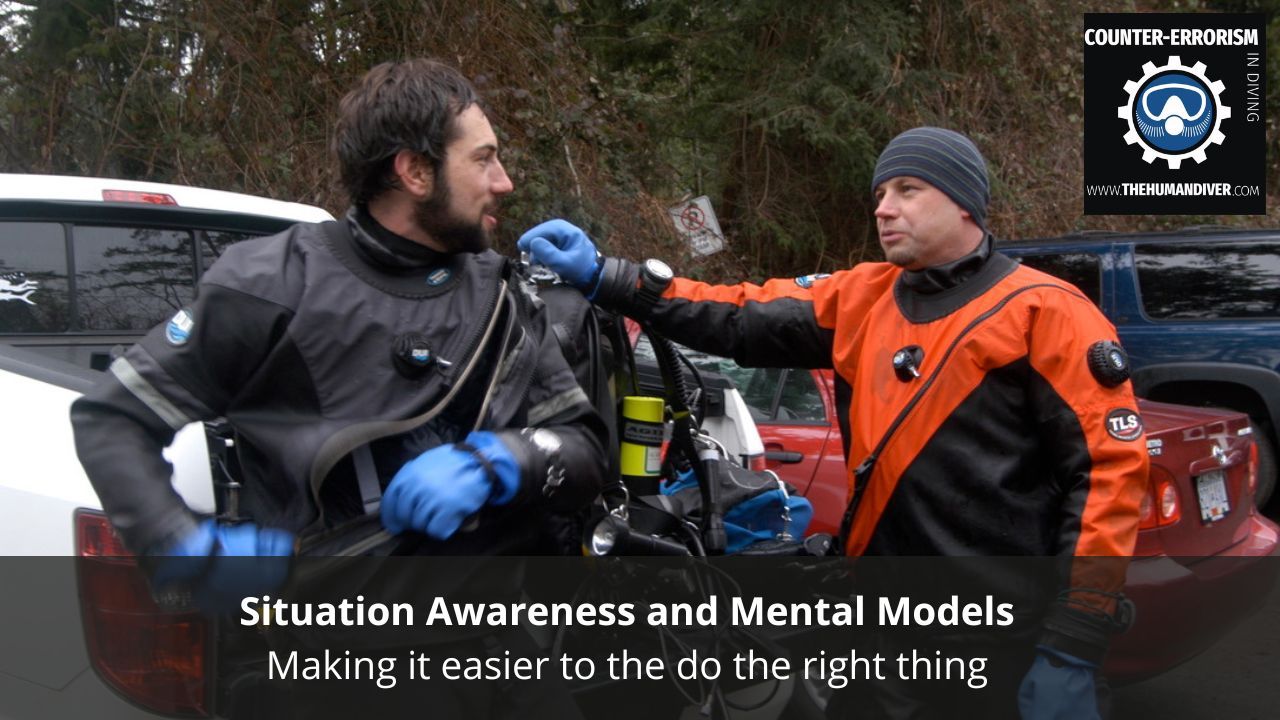
Situation Awareness and Mental Models: Making it easier to the do the right thing
I have reached the conclusion that the number one skill that any diver should seek to develop is the capacity to build and maintain good situation awareness (SA). This might be surprising coming from a technical diving instructor and most people might think the most important skills are technical skills like buoyancy control or proper propulsion techniques. However, hundreds and hundreds of students later, I am more firmly convinced of my statement than ever before.
I usually start a class by asking my students what they think SA means. Most students answer that SA is the ability to perceive information and some add “and process” the information, but few add the third and, in my view, most important component of SA and that is projecting that information into the future to see what is going to happen.
Let me give you an example. I watched two students descend and swim towards a wreck and I could see a spool start to come unwound from the first diver’s pocket. That diver’s teammate noticed the line and swung their light over the pocket and then back to highlight the line that was coming out of the first diver’s pocket. It was clear to me that they had noticed this line. They then proceeded to do nothing about the problem and continued swimming. I asked them afterward and they knew where the line was coming from, and they said they thought it was coming from the spool in the divers left hand pocket. What surprised me the most was that the second diver saw the line, knew where it came from, and then proceeded to do absolutely nothing!

We discussed this afterwards when we surfaced and after I had “facilitated” what could happen with that much line adrift in the ocean around manifolds and cylinders etc.… They clearly understood then what the implications were of choosing to ignore what they had seen but at the time, it hadn’t meant anything to them. The difference was during the debriefing we had the advantage of hindsight and what I had shown them could happen.
But there is a significant difference in buying someone a fish and teaching them to fish and here is where the power of building mental models can help us.
A mental model is a script that we make in our brain and is usually based on “what if” thinking. Mental models are like short cuts for us to use when we face situations that require us to make decisions. Someone with a lot of experience in a particular subject can draw on this experience to create many mental models and the idea of “I’ve seen something like this before” can generate action prompts that get us moving in the direction of solving a problem or managing an issue more quickly than if we must “learn to fish” from scratch. Consider the mechanic that has more tools in their tool chest designed to solve a wide variety of problems. This mechanic will likely find it easier to solve a problem than mechanic with just an adjustable wrench.

Mental models can be as simple as “I see flashing light therefore I need to donate gas” to something more complex that has several stages or even composed of multiple smaller mental models.
Experience is a great contributor to building mental models, but it isn’t enough. To reflect on what we learned, we need to purposefully and systematically consider the experience within some sort of framework and here a structured debriefing is an invaluable tool. It is too easy to miss important details without a formal debrief. A structured debrief allows us to consider multiple angles and options of the same problem and has consistently been shown to be a feature of high performing teams in every domain.
When you tie all this together, you have a diver who can react more effectively to novel situations after they have seen something and understood what it meant. They can apply a mental model they have at the ready that is applicable to the situation and more easily generate a positive outcome. A strong debrief forms the basis for building these mental models.
Further reading from The Human Diver blog: Selective Attention Exists! 5 Tips to Increase Situational Awareness in Diving
Unleashing Your Sixth Sense: Building capacity and directing attention
Running out of gas- Why does this happen and how can we prevent it?
How do I improve my Situation Awareness?
You can't pay MORE attention: the myth of 'loss of situation awareness'
Guy Shockey is one of the Human Diver instructors. He is also a GUE Tech 2 & CCR 2 instructor operating from Vancouver Island, CA. You can find more about him and his courses here The Human Diver resumé and GUE Instructor Resumé

